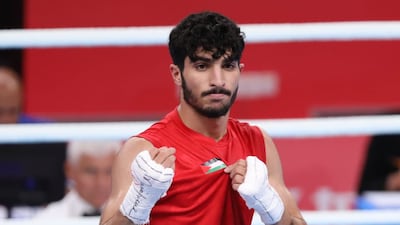Waseem Abu Sal will become the first boxer to represent Palestine at the Olympics after accepting a wildcard pick to compete at the Paris Games.
"This has been my dream since I was 10 years old," he said.
"Every day I went to sleep and woke up thinking about how I could reach the Olympics."
The 20 year old's training preparations for Paris are less than ideal, however.
Every morning he follows instructions from his Cairo-based coach Ahmad Harara, a Gazan who cannot travel to him in the occupied West Bank, sent via text message.
"I only see him when I travel" for international competitions, Waseem Abu Sal told AFP from his gym in the occupied West Bank city of Ramallah.
"He writes my training schedule every day, and I train in the morning, and again in the evening with coach Nader Jayousi."
The Palestine Olympic Committee has been represented on the International Olympic Committee since 1995 despite a lack of statehood. Only 26 athletes have represented Palestine in Olympics history.
Four Palestinians have so far been confirmed for the Games: Abu Sal will join judoka Fares Badawi, shooter Jorge Antoni Salhe and Omar Ismail in taekwondo. The athlete entries’ deadline for Paris is July 8.
Abu Sal will take on his first Olympic fight on July 28 in the men's featherweight division (57kgs) where he will link up with his mentor Harara.
Harara has been unable to see his fighter because of "the occupation barriers between the West Bank and Gaza" as an ID holder of the latter territory.
"Since then, I have been overseeing Wassem's training remotely," Harara said.
Though Abu Sal did not make it through the Olympic qualifying rounds, he received a wildcard spot in a system that ensures representation for all countries at the Games.
The political reality of the West Bank – dotted by Israeli army checkpoints that restrict movement – means Abu Sal is fighting hurdles even before he makes history.
A lack of suitable training partners is one, with Abu Sal forced to spar with much bigger and heavier opponents to wrack up the rounds in the ring.
"This makes it hard to hold tournaments, leading to less competition in the country," he said.
Travelling abroad to train or compete comes with its own difficulties.
"Many countries deny visas to those with Palestinian passports, causing us to miss out on tournaments while waiting for visas," he said.
When Abu Sal flies for Paris in July, he will do so from the Jordanian capital of Amman, which he will travel to from Ramallah by road, as he usually does when going abroad for competitions.
Jayousi, head of the Palestinian Olympic delegation, is a mentor to Abu Sal and trains several fighters out of his Ramallah gym.
"It's a proud moment, not just for me, but for Palestine as the first-ever Palestinian boxer will represent Palestine at the Olympics," Jayousi said.
"We don't have that big number of very good boxers that I can make Waseem train with," he added.
"That's a big challenge for us because iron sharpens iron."
One of the biggest challenges to his Olympic preparation has been the war in Gaza, which started after Hamas' unprecedented attack on Israel on October 7 in which militants killed around 1,200 Israelis and kidnapped about 240 to Gaza.
Israel's retaliatory offensive has killed at least 37,718 people, mostly civilians, according to the health ministry in Hamas-run Gaza.
Among them were athletes or relatives of athletes, according to Palestinian officials.
The devastating conflict and casualty updates knocked the mental health of Abu Sal and his teammates, said Jayousi.
"This has affected our boxers big time, because we were every day getting news about athletes we are losing."
Travelling between the West Bank cities has also become more dangerous due to an uptick in checkpoints, army presence, and settler violence.
Since October 7, Palestinian officials say at least 553 Palestinians have been killed by the Israeli army or settlers who live in settlements the UN considers illegal under international law.

